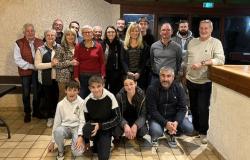For Marta Kostyuk, it was double punishment on Sunday. Beaten sharply by Aryna Sabalenka (6.3, 6-2) in the first round, the Ukrainian had to leave the court under the whistles of the Chatrier public after her refusal to shake hands with her Belarusian opponent. “I didn’t expect this, to be honestthen reacted Kostyuk. I have nothing special to say, but honestly, people should be ashamed of their attitude. We’ll see what they think of that in ten years, when the war is over. I don’t think they’ll feel good acting like thatTo.”
Very impressive during her press conference where the very calm side of the form contrasts with the strength of the substance, the 39th player in the world will cling no matter what to her convictions and their consequences since it is neither the first nor the last time she refused to greet her opponent after a match. “I said I won’t, and I don’t know why people think I’ll suddenly change my mind.”
Roland Garros
Tsitsipas, as usual
AN HOUR AGO
I know players who support this war
“She didn’t deserve this“said Sabalenka for his part about the reaction of the French public. Words that neither touched nor appeased Marta Kostyuk, whose irony sometimes has the effect of an icy knife blade, as when she strikes a “I’m sorry for her” when a journalist reports to her the words of Sabalenka, who recalls that this war places her, like other Russian and Belarusian players, in a delicate situation.
The Belarusian then made a point of once again clarifying his point of view on this conflict: “I have said it many times, no one in this world, whether it is Russian or Belarusian athletes, supports the war. Person. How can we support the war? Normal people will never support her. It’s as obvious as one plus one is two. If we could stop him somehow, we would. But unfortunately it’s not in our hands.”
Except that, for Kostyuk, this answer is without interest because that is not the question. “I think she should talk about herself first. There is no ‘we’. Because I know, I mean personally, players who support this war, she launched. I feel like you (journalists) should rather ask who they think should win the war and not whether they are for or against. The war has been here now for 15 months.“It is therefore not a question of positioning oneself in a theoretical or philosophical way, but in a concrete way. The war in Ukraine is not an idea, but a reality.
Marta Kostyuk, Roland Garros 2023
Credit: Getty Images
I have to keep doing something with my life
Marta Kostyuk had a new reminder of this last night when Russia launched a new air attack, in particular on the capital kyiv, where part of her family still resides. “I usually avoid looking at my phone at night, but when I woke up at 5am for some reason I turned it on and saw that I had a lot of notifications“, she explained. Not ideal a few hours from a Grand Slam match.”I try to put my emotions aside every time I go to the fieldshe recalls. I think I’m doing it better than before. But it’s part of my life.“
Tennis too, although she has seen happier days on the circuit. Has she thought about stopping everything? Yes, but not for long. “I keep playing tennis because I love it and it’s my job, I’m not going to lie, just admits the Ukrainian. It allows me to pay a lot of things. Then I have to keep doing something with my life, so I’m doing what I know how to do best. If I stop playing, I think it’s the end.“
She also returned to what Aryna Sabalenka said before this particular match: “If she hates me, it doesn’t matter, but it’s not mutual.” “First of allreplied in the form of clarification Marta Kostyuk, I have never said publicly or privately that I hate Aryna Sabalenka or any other player. Hatred, like love, is emotional. Me, people can hate me or love me, I don’t care. That’s what she said, no matter if I hate her. But if someone doesn’t respect me, that’s another thing, because respect is not a question of emotion.”
Marta Kostyuk
Credit: Getty Images
Lack of courage
The bridges seem to be permanently cut. The native of kyiv regrets that, since the outbreak of the war, no one has bothered to come and speak to her or to her compatriots. “There must be five Ukrainians in the top 100. It wasn’t that hard when the war started to come and talk to us for even a few minutes. I don’t know, just tell us something. When we met them in the locker room, it was closed mouth and gaze towards the ground. I don’t understand. They had no courage.”
And if someone came to see her, now, to chat, or just say a few words, how would she react? “I don’t know if anyone will, I don’t believe in it much, she continues, but if that were the case I don’t know what my reaction would be because, all the same, 15 months is a long time…“
Marta Kostyuk has not set foot in her country for two months, after the Miami tournament, in order to work on the foundation she has launched. She lives temporarily in Monaco. She brought with her her mother and her little sister, who live not far from her home. His father and grandfather, on the other hand, remained in kyiv. “I live away from home not by choice, but because I can’t stay home“, recalls the 20-year-old player.
Wimbledon has announced its intention to accommodate Ukrainian players during all grass-court tournaments to be held on British soil. One less worry. “I wouldn’t say it shows that gunderstand what we’re going through, because it’s impossible to really understand it, summarizes Kostyuk, but it’s a beautiful geste and, at least, that makes me believe that there are still good people in this world.”
Roland Garros
The day of the French: Lestienne passes close to happiness
2 HOURS AGO
Roland Garros
Monday’s program: Son on the Simonne-Mathieu, Djokovic and Alcaraz will start
3 HOURS AGO






